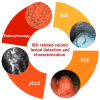Next-Generation Endoscopy in Inflammatory Bowel Disease
- PMID: 37568910
- PMCID: PMC10417286
- DOI: 10.3390/diagnostics13152547
Next-Generation Endoscopy in Inflammatory Bowel Disease
Abstract
Endoscopic healing is recognized as a primary treatment goal in Inflammatory Bowel Disease (IBD). However, endoscopic remission may not reflect histological remission, which is crucial to achieving favorable long-term outcomes. The development of new advanced techniques has revolutionized the field of IBD assessment and management. These tools can accurately assess vascular and mucosal features, drawing endoscopy closer to histology. Moreover, they can enhance the detection and characterization of IBD-related dysplasia. Given the persistent challenge of interobserver variability, a more standardized approach to endoscopy is warranted, and the integration of artificial intelligence (AI) holds promise for addressing this limitation. Additionally, although molecular endoscopy is still in its infancy, it is a promising tool to forecast response to therapy. This review provides an overview of advanced endoscopic techniques, including dye-based and dye-less chromoendoscopy, and in vivo histological examinations with probe-based confocal laser endomicroscopy and endocytoscopy. The remarkable contribution of these tools to IBD management, especially when integrated with AI, is discussed. Specific attention is given to their role in improving disease assessment, detection, and characterization of IBD-associated lesions, and predicting disease-related outcomes.
Keywords: artificial intelligence; chromoendoscopy; confocal laser endomicroscopy; dysplasia; endocytoscopy; inflammation; molecular endoscopy.
Conflict of interest statement
The authors declare no conflict of interest.
Figures


Similar articles
-
Present and future of endoscopy precision for inflammatory bowel disease.Dig Endosc. 2024 Mar;36(3):292-304. doi: 10.1111/den.14672. Epub 2023 Sep 22. Dig Endosc. 2024. PMID: 37643635 Free PMC article. Review.
-
Rediscovering histology: what is new in endoscopy for inflammatory bowel disease?Therap Adv Gastroenterol. 2021 Apr 16;14:17562848211005692. doi: 10.1177/17562848211005692. eCollection 2021. Therap Adv Gastroenterol. 2021. PMID: 33948114 Free PMC article. Review.
-
Role of Advanced Endoscopic Imaging Techniques in the Management of Inflammatory Bowel Disease.Clin Endosc. 2017 Sep;50(5):424-428. doi: 10.5946/ce.2017.143. Epub 2017 Sep 29. Clin Endosc. 2017. PMID: 29017290 Free PMC article. Review.
-
Evolution and New Horizons of Endoscopy in Inflammatory Bowel Diseases.J Clin Med. 2022 Feb 7;11(3):872. doi: 10.3390/jcm11030872. J Clin Med. 2022. PMID: 35160322 Free PMC article. Review.
-
Advanced endoscopic imaging techniques in Crohn's disease.J Crohns Colitis. 2014 Apr;8(4):261-9. doi: 10.1016/j.crohns.2013.09.004. Epub 2013 Sep 29. J Crohns Colitis. 2014. PMID: 24080247 Review.
Cited by
-
Artificial intelligence-enabled advanced endoscopic imaging to assess deep healing in inflammatory bowel disease.eGastroenterology. 2024 Aug 1;2(3):e100090. doi: 10.1136/egastro-2024-100090. eCollection 2024 Sep. eGastroenterology. 2024. PMID: 39944363 Free PMC article. Review.
-
Advancing Colorectal Cancer Prevention in Inflammatory Bowel Disease (IBD): Challenges and Innovations in Endoscopic Surveillance.Cancers (Basel). 2024 Dec 28;17(1):60. doi: 10.3390/cancers17010060. Cancers (Basel). 2024. PMID: 39796690 Free PMC article. Review.
-
Opening the doors of precision medicine: novel tools to assess intestinal barrier in inflammatory bowel disease and colitis-associated neoplasia.Gut. 2024 Sep 9;73(10):1749-1762. doi: 10.1136/gutjnl-2023-331579. Gut. 2024. PMID: 38851294 Free PMC article. Review.
-
AI and endoscopy/histology in UC: the rise of machine.Therap Adv Gastroenterol. 2024 Oct 18;17:17562848241275294. doi: 10.1177/17562848241275294. eCollection 2024. Therap Adv Gastroenterol. 2024. PMID: 39435049 Free PMC article. Review.
-
Artificial intelligence in inflammatory bowel disease endoscopy - a review of current evidence and a critical perspective on future challenges.Therap Adv Gastroenterol. 2025 Jul 13;18:17562848251350896. doi: 10.1177/17562848251350896. eCollection 2025. Therap Adv Gastroenterol. 2025. PMID: 40661220 Free PMC article. Review.
References
-
- Turner D., Ricciuto A., Lewis A., D’Amico F., Dhaliwal J., Griffiths A.M., Bettenworth D., Sandborn W.J., Sands B.E., Reinisch W., et al. STRIDE-II: An Update on the Selecting Therapeutic Targets in Inflammatory Bowel Disease (STRIDE) Initiative of the International Organization for the Study of IBD (IOIBD): Determining Therapeutic Goals for Treat-to-Target strategies in IBD. Gastroenterology. 2021;160:1570–1583. doi: 10.1053/j.gastro.2020.12.031. - DOI - PubMed
-
- Baert F., Moortgat L., Van Assche G., Caenepeel P., Vergauwe P., De Vos M., Stokkers P., Hommes D., Rutgeerts P., Vermeire S., et al. Mucosal Healing Predicts Sustained Clinical Remission in Patients with Early-Stage Crohn’s Disease. Gastroenterology. 2010;138:463–468. doi: 10.1053/j.gastro.2009.09.056. - DOI - PubMed
-
- Colombel J.F., Rutgeerts P., Reinisch W., Esser D., Wang Y., Lang Y., Marano C.W., Strauss R., Oddens B.J., Feagan B.G., et al. Early Mucosal Healing with Infliximab Is Associated with Improved Long-term Clinical Outcomes in Ulcerative Colitis. Gastroenterology. 2011;141:1194–1201. doi: 10.1053/j.gastro.2011.06.054. - DOI - PubMed
Publication types
LinkOut - more resources
Full Text Sources

